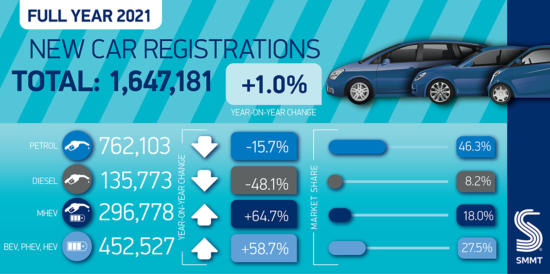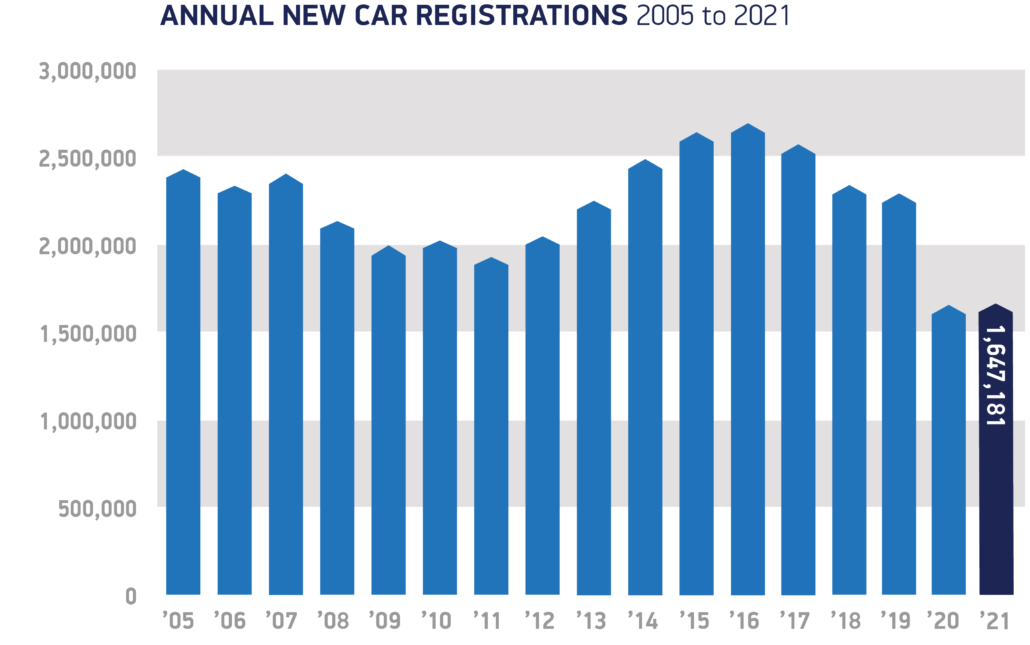Most successful year for electric cars, but 2021 UK registrations just 1% higher than 2020

2021 UK car sales were stalled by Covid and its impact on the supply chain, the Society of Motor Manufacturers and Traders explains. 1.65 million new cars were registered in an increase of just 1.0 per cent on pandemic-ravaged 2020, making it the second-worst year since 1992. Sales were -28.7 per cent below pre-Covid levels thanks to headwinds, which included the semiconductor shortage. However, figures did show that the transition to electric cars is proceeding quickly. More than one in six registrations were plug-in, while battery electric cars alone rose to one in nine. Overall, the SMMT notes that this means more BEVs (Battery Electric Vehicles) were registered than in 2016-2020 combined. The society added that the UK auto industry is calling for the government to extend incentives and mandate chargepoint targets. It argues that the UK needs to accelerate consumer uptake of EVs, maintaining the country’s attractiveness against competitor markets.
Electric vehicle records
The SMMT said that 190,727 new BEVs joined Britain’s roads, along with 114,554 plug-in hybrids (PHEVs), meaning 18.5 per cent of all new cars registered in 2021 can be plugged in. This is in addition to the 147,246 hybrid electric vehicles (HEVs) registered which took a further 8.9 per cent market share in a bumper year for electrified car registrations, with 27.5 per cent of the total market now electrified in some form.
The SMMT said that billions of pounds of investment into new technology by manufacturers has resulted in the availability of more than 40 per cent of models as plug-ins. December BEV sales represented a record market share in a trading month not under lockdown, accounting for 25.5 per cent of all new registrations.
The UK finished 2021 as the third largest European market for new car registrations but the second largest by volume for plug-in vehicles and the second largest for BEVs. While this shows the acceleration of this segment in 2021, the SMMT said the UK is still only in ninth position overall in Europe for BEVs by market share, despite the UK’s ambitious target to end the sale of new petrol and diesel cars by 2030. The society also argued that the recently announced cuts to both purchase incentives and grants for home chargers “put the achievement of industry’s and government’s net zero ambitions at risk.” It also identified the slow growth of on-street public charging as a potential headwind for future growth. On average, 16 cars potentially share one standard on-street charger.
Petrol-powered vehicles, including mild hybrids (MHEVs), remain Britain’s most popular powertrain, accounting for 58.3 per cent of all new cars registered in 2021, with diesel-powered cars including MHEVs making up 14.2 per cent of the market, followed by BEVs at 11.6 per cent, HEVs at 8.9 per cent and PHEVs at 7.0 per cent.
Other details
The SMMT added that registrations by private buyers increased by 7.4 per cent. Those by businesses and large fleets fell by -4.4 per cent and -4.7 per cent respectively, in part due to supply shortages.
Superminis remained Britain’s most popular cars, with 514,024 registrations, followed by the lower medium (449,631) and dual purpose (443,632) segments.
The latest forecast for 2022 is for 1.96 million new car registrations. However, the fact that this was published in October, before the rise of the Omicron variant of Covid, suggests the figure should be taken with a pinch of salt.
Mike Hawes, SMMT chief executive, said, “It’s been another desperately disappointing year for the car industry as Covid continues to cast a pall over any recovery. Manufacturers continue to battle myriad challenges, with tougher trading arrangements, accelerating technology shifts and, above all, the global semiconductor shortage which is decimating supply.
“Despite the challenges, the undeniable bright spot is the growth in electric car uptake. A record-breaking year for the cleanest, greenest vehicles is testament to the investment made by the industry over the past decade and the inherent attractiveness of the technology. The models are there, with two of every five new car models now able to be plugged in, drivers have the widest choice ever and industry is working hard to overcome Covid-related supply constraints.
“The biggest obstacle to our shared net zero ambitions is not product availability, however, but cost and charging infrastructure. Recent cuts to incentives and home charging grants should be reversed and we need to boost the roll out of public on-street charging with mandated targets, providing every driver, wherever they live, with the assurance they can charge where they want and when they want.”





Comments